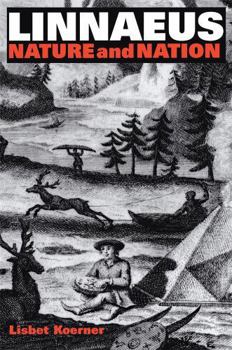Linnaeus: Nature and Nation
Select Format
Select Condition 
Book Overview
Drawing on letters, poems, notebooks, and secret diaries, Lisbet Koerner tells the moving story of one of the most famous naturalists who ever lived, the Swedish-born botanist and systematizer, Carl Linnaeus. The first scholarly biography of this great Enlightenment scientist in almost one hundred years, Linnaeus also recounts for the first time Linnaeus' grand and bizarre economic projects: to "teach" tea, saffron, and rice to grow on the...
Format:Paperback
Language:English
ISBN:0674005651
ISBN13:9780674005655
Release Date:April 2001
Publisher:Harvard University Press
Length:298 Pages
Weight:1.00 lbs.
Dimensions:1.0" x 6.2" x 9.2"
Customer Reviews
4 ratings
Interesting Reading.
Published by Thriftbooks.com User , 23 years ago
Linnaeus : Nature and Nationby Lisbet Koerner Reviewed by Thomas Leo Ogren, author of Allergy-Free Gardening, Ten Speed Press. Honestly I have mixed feelings about this book. One, I love it and really did enjoy reading it. I learned quite a bit from it too. But I do wish it had been written in a more reader-friendly manner. It is a good bit too scholarly for my tastes, a trifle too text-bookishly written. One of the important things about Linnaeus himself is that he always tried to reach the common man, tried to make his work popular and easily understood. I feel this book could have emulated some of that flavor. But I don't mean to be too critical by any means because I did like this book very much. There is a real wealth of research here, many things about Linnaeus here that I'd never read before. Karl Linnaeus was THE botanist--of his time, and of our own time as well. His system of binomial nomenclature, Genus species, was pretty much right on the money. He was the first to realize that plants' sexual characteristics were what largely either grouped them together or set them apart. His system is often criticized today, but to me it still makes great sense. Linnaeus : Nature and Nation, is not for everyone, but serious gardeners will enjoy it, as will historians, especially those with an interest in botany, horticulture, science. Well worth reading.
The Big Issue
Published by Thriftbooks.com User , 23 years ago
‘Gazing at a flower by the grass-roofed cottage where he was born [...] Linnaeus was quintessentially a local man.’ (187). But as Lisbet Koerner explains, he also linked the ‘universal with the local [...] nature with nation.’ In this fascinating account, Koerner demonstrates that the father of modern taxonomy was also a political economist. Unlike Adam Smith, his interest was no so much in international trade or colonial conquest, but the substitution of imports (a cameralist program).Although Linnaeus had travelled in Holland, France, and Engalnd (1735-48) there were nineteen ‘first-generation’ students who undertook ‘voyages of discover’ between 1745 and 1792. Koerner asserts that their travels ‘were part of their larger strategy to create a miniature mercantile empire within a European state’ (114). Linnaeus sensed that ‘explorers fostered strategies of national improvement based on ecological diversification rather than on territoral expansion.’ (114).Linnaeus, it is argued was essentially a civil servant who turned his students into an efffective and efficient support staff. Chapter 3 deals with the Lapland journey. In line with economic and political priorities the area was to be colonized as a kind of Scandinavian "West Indies". As a committed Lutheran, its is fascinating to deconstruct the theology at work in Linnaeus’s thought. Nature was a prelapsarian Paradise, but it must be exploited within each country. Accordingly, Linnaesus was concerned by the luxury and excess of products that trade supplied from the cornucopia of the New World. As this book notes, ‘He even urged Scandinavians to return to the old "Gothic foods," such as acorns, pork, and mead.’ (95) At the same time he was keen to cultivate at home (to acclimatize) what was normally cultivated abroad. We even find him thinking, theorizing, and cultivating ‘an art to Make Mussles bring forth pearls.’ (141) He professed an an axiety that the pearl plantaions ‘could not long remain secret before our neighbours in Norway, Russia, and Siberia, who own more stores of Pearl mussels, could thus intirely triumph over us in quantity.’ (143)Yet as Linnaeus’s stock rose in Europe among the Romantics, at home it fell as he failed to deliver economic adavantage and superiority through import substitution. Ernst Moritz Arndt attacked Linnaeus’s cameralist projects in 1783, wondering how ‘On e was supposed to believe that Sweden suddenly had become Asia Minor and Sicily.’ (168) His enterprising schemes turned out to be ‘fantastic and chimerical’; it was left to his taxonomic system to enrich the world. Nonetheless, in light of recent global protests and persistent underdevelopment, the larger issues which the book eloquently discusses, seem to me as relevant now as then. ‘Linnaeus: Nature and Nation’ concludes by stating that it ‘memorializes a local attempt at a local modernity, a now-forgotten future of the past’ (193), but the other issue it raises is timely:‘Or can native subjects, us
Thank God the world isn't run by professors
Published by Thriftbooks.com User , 24 years ago
A fascinating account of what a strange place the 18th century was. The age of confusion more than the age of reason. Who would have thought that Linnaeus had so much in common with today's new age cranks.
Well done!
Published by Thriftbooks.com User , 24 years ago
A biography filled with wonderful detail, even though centering on Linnaeus' economic program. At times the author appears to be making fun of Linnaeus' odder ideas rather than attempting serious historical analysis, but in all a good job and an interesting argument.






